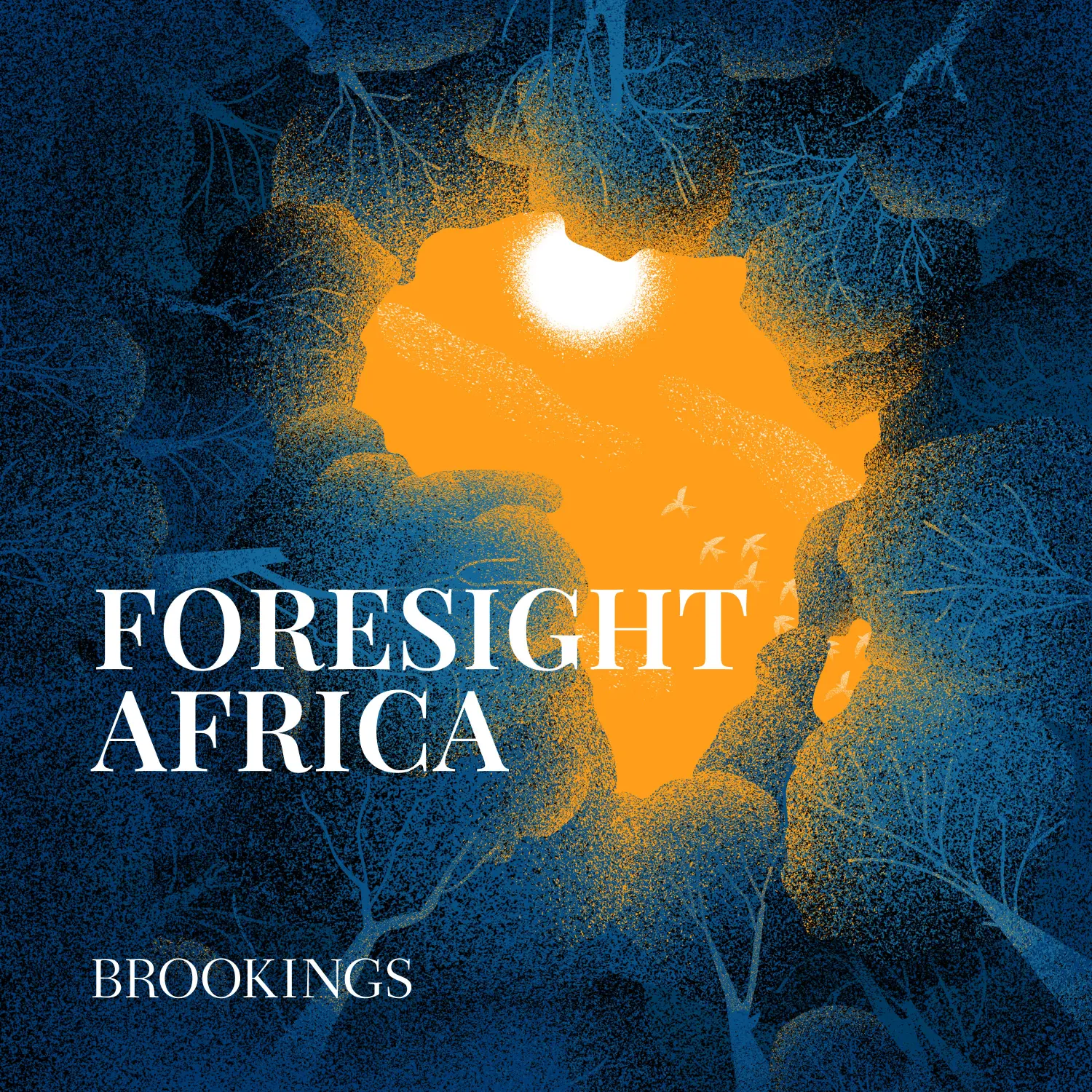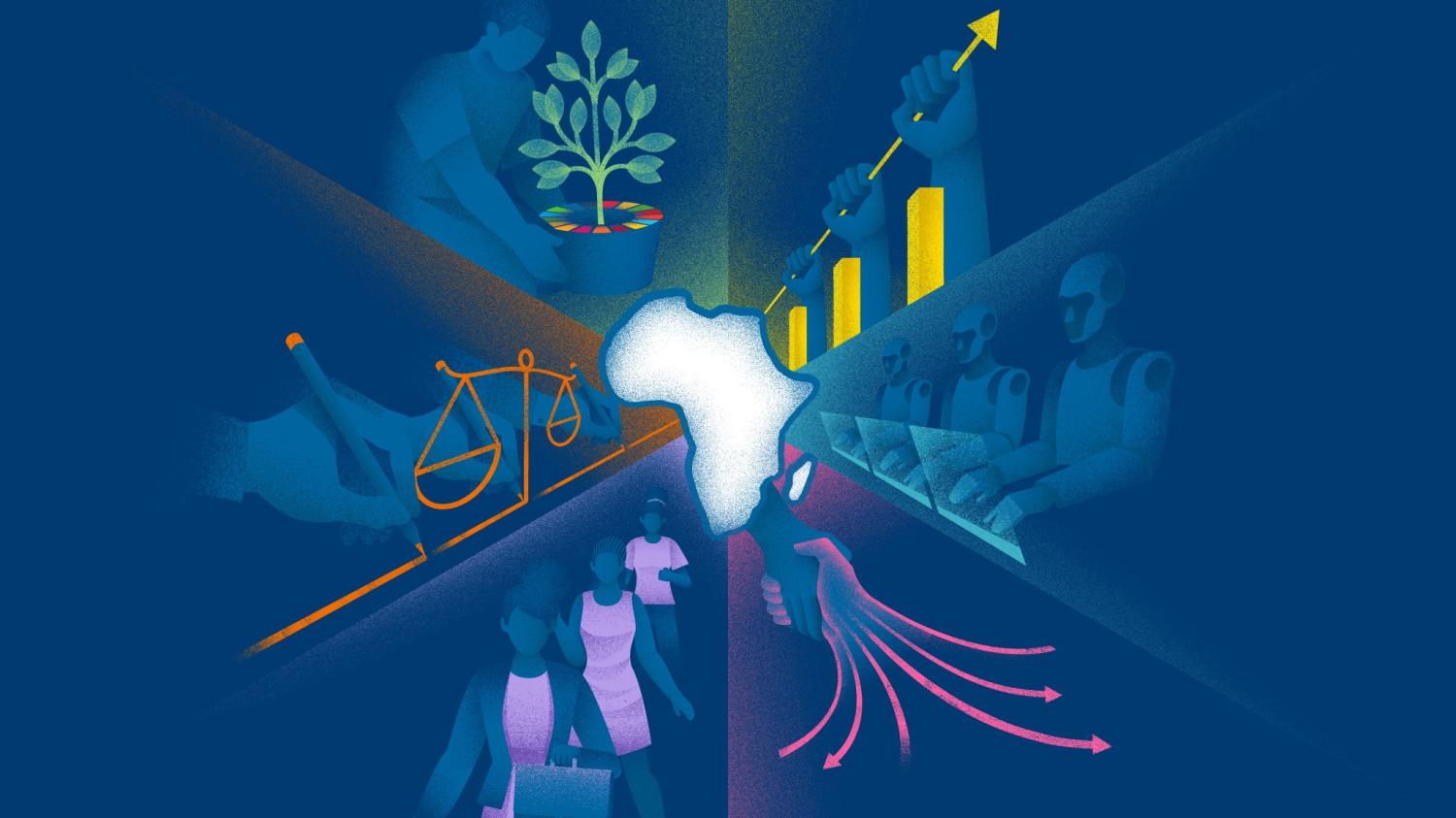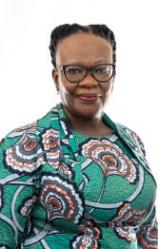Host Landry Signé speaks with Hon. Selma Ashipala-Musavyi, Namibia’s minister for international relations and trade, and seasoned career diplomat, on the need for African countries to think locally while acting continentally, and how agreements like the AfCFTA and a spirit of solidarity among African countries create opportunities for Africans and international partners alike.
- Subscribe to Foresight Africa on Apple, Spotify, Afripods, or wherever you listen to podcasts.
- Listen to previous episodes.
- Watch episodes on YouTube.
- Learn about other Brookings podcasts from the Brookings Podcast Network.
- Sign up for the podcasts newsletter for occasional updates on featured episodes and new shows.
- Send feedback to [email protected].
Transcript
[music]
SIGNÉ: Hello, I am Landry Signé, senior fellow in the Global Economy and Development Program and the Africa Growth Initiative at the Brookings Institution. Welcome to Foresight Africa podcast, where I engage with distinguished leaders in policy, business, academia, and civil society to share their unique insights and innovative solutions to Africa’s challenges, while highlighting opportunities to advance engagement between Africa, the U.S., and the global community. You can learn more about this show and our work at Brookings dot edu slash Foresight Africa podcast.
My special guest today is Honorable Ambassador Selma Ashipala-Musavyi, minister for international relations and trade of the Republic of Namibia. She has served as high commissioner or ambassador to several countries including Ghana, Sierra Leone, Togo, Benin, Côte d’Ivoire, Liberia, and Austria, such an important number of countries, and she has also represented her country in various diplomatic roles at the United Nations and here at the embassy in Washington, D.C. Thank you so much for being here with us today, Honorable Minister.
ASHIPALA-MUSAVYI: Well, thank you very much. The pleasure is really mine, Landry, to be here at the Brookings Institution. It’s a pleasure really, and to be back to D.C., where I served as you mentioned earlier.
SIGNÉ: Amazing. Honorable Minister, you have had a long and impressive diplomatic career going back over 30 years and spanning several countries. How did you get started in the foreign service and what are the proudest achievements from your career?
[2:38]
ASHIPALA-MUSAVYI: Well, how did I start? I’m a student of international relations. I went to Keele University in the UK, obtained my master’s degree in diplomatic studies, and then at independence I applied to the Ministry of Foreign Affairs then, and I started as a deputy director. So my first posting was to the United Nations. I actually opened our mission in New York as a counselor. And then the rest is history as you have narrated.
SIGNÉ: Wow! You opened the mission!
ASHIPALA-MUSAVYI: Yes, in New York.
SIGNÉ: At the United Nations.
ASHIPALA-MUSAVYI: Yes, yes, yes.
SIGNÉ: Amazing!
ASHIPALA-MUSAVYI: Yes. And then I served in New York. I served in D.C. And then my first posting as ambassador was to Austria because of my multilateral background. And then I was concurrently accredited to so many countries also.
[3:37]
What I can really say is my proudest moment in my diplomatic career, there are many, but there are some which are very dear to me. The first one is in New York. When Namibia was a non-permanent member of the UN Security Council, 2000 and 2001, what happened is that people will come from the Secretariat and they brief us. And during that first year, Landry, I tell you, there was only two women who came to brief on political conflict situations in Africa.
Now, I am from the background of a national liberation struggle where women have contributed to the freedom and independence of Namibia. And I sat there, and I asked myself, and everybody will talk about there is conflict here, there is a conflict there, women and children are dying. And I asked, myself, does it mean that women can only be victims of conflict? Can they not contribute to peacemaking?
So when our time came to basically have a theme during our presidency, we consulted with our ambassador, and we agreed to have a meeting on women, peace, and security. And that resulted in the resolution of the UN Security Council 1325, very famous resolution.
SIGNÉ: Wow.
ASHIPALA-MUSAVYI: Which is about engaging women in peacemaking and peacebuilding. So, because I was part of that team, that’s a proud moment.
Then I went to Ghana, where I served as high commissioner. And I visited a public hospital, the biggest in Accra. I went through the pediatrics section and the doctor said, you know what, ambassador, we’ll really appreciate if you can find us, I think they needed an inhaler, a machine, yeah, for pediatrics. And I was busy preparing my National Day reception.
SIGNÉ: Wow.
ASHIPALA-MUSAVYI: So I discussed with my colleague and said, we have a choice to make. It’s either we buy this ventilator for the pediatric hospital, or we have reception to mark our independence. So we opted for buying the ventilator. Every penny that we wanted to use for the reception, we used for the ventilators. And guess what? Ghanaian businesspeople heard about what we have done and they decided to sponsor our reception. So we have two. You see, the spirit of Africa, Ubuntu, I am because you are.
SIGNÉ: That is incredibly amazing, Honorable Minister. Yes. Since you first entered the Foreign Service, how have Namibia’s relations with international partners, both bilateral and multilateral, from the Global North or the Global South, evolved? And how do you see such relationships progressing in the future?
[6:42]
ASHIPALA-MUSAVYI: They have evolved considerably because after independence, the priorities were different. We were focusing on building a nation–a nation that was fragmented–and building schools, building hospitals.
So fast forward, we now have more bilateral partners, both in the Global North and in the Global South. And the priorities are basically determined by the evolution of the socio-economic needs of our country. Namibia is a mining country. We are now focusing on basically bringing education, not only in the cities, rural areas; health facilities to the rural areas; getting all the children into school; gender equality; creating jobs for our young people; and basically telling the world that we are a player and we are ready to engage everybody.
SIGNÉ: Amazing! I really like this, especially given the incredible performance of the economy that you have had. Honorable Minister, on June 30th, Namibia marked a major milestone with its first export to Nigeria under the African Continental Free Trade Areas trade rules, AfCFTA. How do you expect this trade agreement to impact Namibia’s trade with African countries in the next decade, including those you have been trading with under the Southern African Customs Union, SACU, for which you are also chair?
[8:28]
ASHIPALA-MUSAVYI: Well, that was a proudest moment for Namibia, really, being listed as one of the countries that have complied with all the rules under the AfCFTA. I think it’s important to mention that SACU, which is the Southern African Customs Union, and AfCFTA are complementary, because in SACU we trade among ourselves, and we determine the external tariff. So that is regional. With the AfCFTA is continental.
What we are hoping is that what we have done by sending our salt consignment to Nigeria is basically marking a beginning of Namibia’s trading under the AfCFTA rules. So we are hoping to have more products. We are hoping that we will encourage and generate more investment to come into Namibia for us to industrialize, for us to consolidate our manufacturing sector. Because what we want to do, and I think really I speak for the entire continent, we want to stop sending our raw materials.
SIGNÉ: Absolutely.
ASHIPALA-MUSAVYI: Because as somebody have said, we are exporting wealth and we are importing poverty because we are exploiting our jobs.
SIGNÉ: Absolutely!
ASHIPALA-MUSAVYI: So we want to add value to our products so that Africa can industrialize and the Africa we want can actually become a reality where there’s prosperity for our people on the continent.
SIGNÉ: Fabulous, Honorable Minister! I really like how you connect the dots and focusing on unlocking not just trade, but also industrial potential, the industrial development potential.
ASHIPALA-MUSAVYI: Exactly.
SIGNÉ: Honorable Minister, as Namibia continues its journey toward economic transformation and sustainable development, could you please share which sectors you consider most promising for attracting trade and investment and accelerating development over the next decades? And what key opportunities should African and international partners be aware of to support and invest in Namibia’s long-term vision for inclusive and resilient growth?
[10:55]
ASHIPALA-MUSAVYI: Yes, thank you very much. Our economic and development blueprint is called Vision 2030. We only have five years to go, where we have decided that by the end of 2030, the living standards of Namibians should be very close to those who live in industrialized countries. And in order for us to do that, industrialization is key.
Now the question you have posed is which sectors? The current government, which is led by our president, Dr. Netumbo Nandi-Ndaitwah, she has identified seven priorities. And this is agribusiness, quality education and training, quality health and social services, youth empowerment, creative industries, sports, together with land, housing, and sanitation. So you can see that the focus is really on the young people.
In terms of the sectors for opportunities for investors, Namibia is a coastal state. And when you are a coastal state, we have ports. And these ports are very critical for connectivity on the African continent in terms of the African Continental Free Trade Area. So there are opportunities at the port management, depending of port. That is one.
Number two, we’ve recently discovered oil and gas. So there are also opportunities in that sector, including in developing our local content sector. Agribusiness, we are well known for animal husbandry. So there are opportunities in meat processing.
Then we have one of the important tourist destinations in Southern Africa. Where the opportunities are in tourism is tourism infrastructure: hotels, lodges. Namibia is very attractive to tourists. And if anybody comes to Namibia to want to invest in there, honestly, it’s a very lucrative sector.
And then we also have opportunities in the transport infrastructure. So those are also some of the opportunities that can be considered. Health also, the infrastructure again, building hospitals, building clinics. Affordable housing, water infrastructure.
Namibia is open for business and everybody is welcome to come to our country and invest. And you will be able to basically make money and export your profits.
SIGNÉ: I love the fantastic response, Honorable Minister, how you really discuss all the key areas, the opportunity, where they are, but also the sector, which can really help ensure the transformation of the Namibian economy.
ASHIPALA-MUSAVYI: Yes, because we are focusing on value addition on our raw materials, value addition, value addition, value addition.
SIGNÉ: And high return on investment!
ASHIPALA-MUSAVYI: And high return on investment, so it’s a win-win—
SIGNÉ: —absolutely! —
ASHIPALA-MUSAVYI: —for Namibians and for the investor.
SIGNÉ: I could not agree more. Thank you so much, Honorable Minister.
ASHIPALA-MUSAVYI: Yes.
SIGNÉ: Having represented Namibia in the U.S. in the past, where do you see opportunities for mutual collaboration between the U.S. and African countries?
[14:26]
ASHIPALA-MUSAVYI: The U.S. has really been a very important partner for Africa. I can point to the African Growth and Opportunity Act, which has benefited so many countries. But not only that, the U.S. itself has also benefited. So as we engage in intra-African trade, we need technology. And this is an advanced country. We can tap into the technological advances of the United States. So those are opportunities that can be tapped.
But you know, I always say that we need to look at trade not just in terms of trade. Trade is driven by people. So we need people-to-people contacts, bringing Africans and Americans together. They will find ways of doing business. So that soft power need to be exploited to the fullest. So I think that is what I can say about the United States.
And it’s already happening. A lot of U.S. companies are investing on the continent. And there are also Africans who are taking an interest in opportunities here. So there’s a win-win. And we are just hoping and praying that AGOA will be extended come September this year.
SIGNÉ: Amazing and I really like the people-to-people diplomacy, engagement, and I release a piece on the new U.S. strategy for Africa under the Trump administration. And I received as feedback that people were so happy that I have emphasized the people-to-people engagement and diplomacy.
ASHIPALA-MUSAVYI: Yes, people have power. Do not underestimate people’s power.
SIGNÉ: Fabulous, Honorable Minister! The World Bank recently announced through its Multilateral Investment Guarantee Agency, MIGA, that it would offer guarantees to back private investment in the tourism sectors of seven countries, including Namibia. What role does tourism play in your government’s effort to diversify your economy?
[16:43]
ASHIPALA-MUSAVYI: Tourism is one of the major economic sectors in Namibia, as I mentioned. It contributes about 12% to our GDP. And we still need tourists to come to Namibia. We have been advocating for intra-African tourism. And we are hoping that, you know, Namibia being included in that list, that will help more tourists to come to Namibia.
But while we are talking about the World Bank, you know that they’ve also announced that Namibia is now going to be classified as a lower middle-income country, which is really good news for us because we come from a background of high inequality because of our history. So we are hoping that this reclassification will be beneficial to Namibia in terms of accessing preferential loans and so on.
But we are inviting the world to come to Namibia, to enjoy the fauna and the flora of Namibia. We have the highest dunes in the world. So come and climb on our dunes, see the convergence of the sand dunes in the Atlantic Ocean, and feel the warmth of the Namibian people.
SIGNÉ: That look incredibly amazing, Honorable Minister, and I will meet you very soon in Namibia. I always like to end each interview by asking the guest two questions. First, building on your work and experience, Honorable Minster, what is one piece of advice you would give to African or global policymakers to ensure the best outcomes on the continent?
[18:31]
ASHIPALA-MUSAVYI: I think for the African policymakers who are really the African leaders is to say, let’s act like an African union. Let’s think locally but act continentally. It’s only Africans who can develop Africa. Our development partners can only complement what we are trying to do. So that will be my advice.
SIGNÉ: Fabulous! And for the international partner?
ASHIPALA-MUSAVYI: For the international partner is to say we all belong to one world. Let’s first have peace because without peace there’ll be no development. For me personally I really believe that there is no one country in this world which is big enough to go it alone. And there is no one country which is too small to make a contribution to international peace and development. We are interdependent, and we need each other. And that is the spirit of the United Nations Sustainable Development Goals, to which we all have subscribed.
SIGNÉ: I couldn’t agree more and the Ubuntu spirit as well. I am because you are—
ASHIPALA-MUSAVYI: —because you are—
SIGNÉ: —stronger together—
ASHIPALA-MUSAVYI: —stronger together.
SIGNÉ: Second, Honorable Minister, given your successful, incredibly successful career and phenomenal impact, what advice would you give to youth, especially young girls, hoping to follow in your footsteps?
[20:12]
ASHIPALA-MUSAVYI: Well, there are a lot of people who have made much bigger impact. I thank you for recognizing the little impact that I’ve made. You know, our president said something the other day which really touched me. She said, women don’t need permission to lead. And I think that will be my advice—
SIGNÉ: —powerful—
ASHIPALA-MUSAVYI: —exactly, to young girls to say, take your place at the table. Study, listen to your elders, read about those whom you think have made an impact. And Africans wherever you are, always remember where you come from. Make a positive impact where you are but never forget that there is a continent that is waiting for you.
SIGNÉ: What a beautiful way to end the interview, Honorable Minister.
ASHIPALA-MUSAVYI: Thank you.
[music]
SIGNÉ: Thank you so much for joining me today.
ASHIPALA-MUSAVYI: Thank you very much, Landry, it was a pleasure. And see you in Namibia.
SIGNÉ: Absolutely, Honorable Minister.
I am Landry Signé, and this has been Foresight Africa. Thank you, listeners, for joining me today.
The Foresight Africa podcast is brought to you by the Brookings Podcast Network. Send your feedback and questions to podcasts at Brookings dot edu. My special thanks to the production team including Fred Dews, producer; Nichole Grossman, Dafe Oputu, and Nicole Ntungire, associate producers; Gastón Reboredo, audio engineer; and Izzy Taylor, senior communications coordinator in Brookings Global.
The show’s art was designed by Shavanthi Mendis. Additional promotional support for this podcast comes from my colleagues in Brookings Global and the Office of Communications at Brookings.
The Brookings Institution is committed to quality, independence, and impact.
We are supported by a diverse array of funders. In line with our values and policies, each Brookings publication represents the sole views of its author(s).








Commentary
PodcastNamibia’s foreign minister on the transformative impact of trade and foreign policy for Africa’s development
Listen on
Foresight Africa Podcast
July 23, 2025